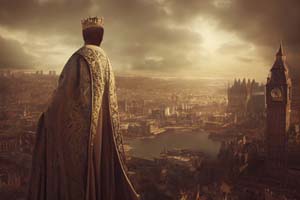Why Only One-Person-Leadership? Clinging to Monocracy

 Another hole in modern democracies, which demands a reform, is the continuation of the model of one-man (one-person) leadership. This old-fashioned system of governing can be traced back to the distant past. There seems to be a genetic imprint and commonality with other high primates that we somehow cannot get away from the notion of the alpha-male as the single leader of a group, tribe, herd, etc. As human societies and religions evolved over the centuries, the role of the alpha male transmuted from perhaps a tribal chief into the title of a king or queen or emperor or papacy as the ultimate ruler, often supposedly divinely appointed. Thus, the first societal monocracy was in the form of hereditary monarchies and as we know, this structure has lasted for centuries, even up to the present day.
Another hole in modern democracies, which demands a reform, is the continuation of the model of one-man (one-person) leadership. This old-fashioned system of governing can be traced back to the distant past. There seems to be a genetic imprint and commonality with other high primates that we somehow cannot get away from the notion of the alpha-male as the single leader of a group, tribe, herd, etc. As human societies and religions evolved over the centuries, the role of the alpha male transmuted from perhaps a tribal chief into the title of a king or queen or emperor or papacy as the ultimate ruler, often supposedly divinely appointed. Thus, the first societal monocracy was in the form of hereditary monarchies and as we know, this structure has lasted for centuries, even up to the present day.
With the advent of democracy in the Enlightenment, the central role of the hereditary monarch then morphed into a new title: a president or prime minister, but this time elected in a democratic system. Interestingly, even though some of the leaders are elected rather than following hereditary succession, our primatological mindset and biology still seem to largely determine our political and religious hierarchies and our collective desire to have one powerful entity be the primary decision-maker for us all.
Too Much Power for One Man
It must be acknowledged that the Enlightenment definitely represented a leap forward in curbing the absolute power of the monarchs and priests. The adoption of congresses, parliaments, judicial branches, and other techniques aimed at balancing out the power structures in democracies were designed to reduce the power of The One. But the rebalancing was not as effective as one might think. In fact, in a strange twist of the word ‘democracy,’ people’s power was not maximized and instead, one-man power has actually increased in modern democracies such as France and the U.S. For example, the French president has an extraordinary power bestowed to him in the constitution. He has the power to “hire and fire” the government including the prime minister and all cabinet members, and can dissolve the National Assembly; he is the Chief of the Armed Forces and can order the use of nuclear weapons. That is a lot of power for one individual to have in a democracy.
The role of the U.S. president is also extremely powerful, beyond what many people realize. For example, as “Commander in Chief,” the president can declare war. It wasn’t until 1973 that such king-like power to escalate a war was finally limited – yet the president still has the power to declare a war for 30 days without the approval of the legislative body – enough time to destroy and ravage the planet with a nuclear war. The president has additional special powers that again sound almost kingly, such as the power to veto legislation, set foreign policy, pardon criminals at will, and be immune from prosecution. The list of powerful privileges goes on. This is a huge job and too much power for one person to handle.
In fact, we have been warned by intellectual voices over the centuries of the risks of vesting too much power into the hands of a few. In ancient times, Socrates was skeptical about the deceptive nature of democracy and elections whose contenders abuse the gullibility of the masses. He thought elections are about manipulating the masses by promising tempting yet undeliverable things. Perhaps Socrates was not too far off in his postulation that democracies have the potential to become corrupt if the politicians serve the interests of the small group of elites instead of the people.
Can Democracy Replace One Person Politics?
Western officials throughout the decades have issued similar warnings that point to the problems of democracy. Winston Churchill famously declared in 1947 that “democracy is the worst form of government except all those forms that have been tried, from time to time.” Almost a century earlier, in 1859 in Ohio, Abraham Lincoln also expressed concern about the fate of democracy, saying: “The people — the people — are the rightful masters of both congresses, and courts — not to overthrow the constitution, but to overthrow the men who pervert it.” During the Civil War in Gettysburg in 1863, he also reminded people that democracies need new births: “…these dead shall not have died in vain – that this nation, under God, shall have a new birth of freedom and that government of the people, by the people, for the people, shall not perish from the earth.”
In other words, the elected officials in democracy should be the servants of the people, not their masters holding so much power.
The curious thing of democracies of today is that despite the obvious issues with monocracy and despite the existence of bodies such as Parliaments and Senates, etc., neither people nor their governments have been able to let go of the one-person-rule model or have been able to find a solid alternative to electing one single person. Perhaps it is simply more practical to have one person as a leader. Or perhaps it is a habit of neural pathways, instinctive and ingrained from millennia of growing up within such pyramidal power structures. But in fact, the argument against relying on one leader is a rational and statistical reckoning: When one person alone is the head of the state, it is much easier for him to manipulate the decisions, or be manipulated. Bribery is more possible. If the one leader turns out to be mentally unstable, the society is the victim of his instability. So, it is even more puzzling that, despite modern awareness of such risks of power being consolidated in one person, politically we still find ourselves in a pre-modern setting, orbiting our biological disposition of having an alpha in the center, and ourselves revolving around him (or her) as a herd.
Are Monarchies Finally Becoming Passé?
English-born progressive political thinker, Thomas Paine, in his work of Common Sense (a pamphlet published in 1776; two years after his arrival in America), was absolutely correct by saying if the hereditary monarchs are not elected, why should they have so much power? Why should the monarchs have so many privileges while many honest hard-working people have more worth in the society? He added, people can do very well without kings, as the American Revolution symbolized that by overthrowing the tyrannical king of England and became a republic. Perhaps some of the longest lasting examples of monarchies can set an example of moving beyond their own model. Can present kings, queens, princes and princesses retire and lead their lives as private citizens like everyone else, feasibly even pursuing constructive and philanthropic careers with their extensive fortunes?
We should ask ourselves whether perhaps these monarchical traditions are finally becoming démodé in our modern era, particularly considering their unearned hereditary power in the face of democracies and elections. Even though most European monarchies today have limited political power, their power is certainly not zero, and they still often hold powerful roles on the side of governments, especially the monarch of England. Instead, they could convert their power and the adoration of their people into the transformative power of empowerment. The former King of Bhutan set a brilliant example when he stepped down in 2006 (of course in favor of his eldest son), insisting that his country’s citizens learn the basics of democracy, and stop depending on him and his solitary leadership.
Certainly, there are masses of people who emotionally enjoy the theatrical and colorful traditions of monarchy, and it would be a shock to them to abolish these systems and usher in a non-monarchical system. But in one way or another, it must be admitted that it was our rational and egalitarian values, not our emotionality, that brought about the Age of Reason and Enlightenment. Nothing is forever and change is inevitable.
Referenda and Councils
So, how can such changes be done practically? First, change can come peacefully and dynamically in countries by holding referenda not just in times of crisis, but regularly, such as every 40 years, to reassess the health of the political system and the appropriateness of the constitution. Constitutions and politics must correspond to the needs and maturity of the emerging generations. (See the link: Considering Adaptable and Responsive Constitutions?)
Atavism in politics leads to decline and decay in society. Electing politicians who understand the pending and critical issues of the time and who could work in concert and in councils would make politics healthier and more responsive. Term limits in the legislative branch would open space for new and fresh voices, rather than have so many career legislators in their seventies or eighties stuck with old ideas. To have a better balance of understanding of critical relevant issues (for example, environmental issues, social media, LGBTQ rights, etc.) there needs to be more representation by the new generations.
It is important to note here that the pioneers of the Second Enlightenment will mark history of the 21st century and beyond. They shall be remembered with honor because of their bravery and farsightedness in bridging the gaps and preventing the future discrepancies in democracies to come.
As Lincoln put it, democracy needs new births. And yet the idea of making structural changes in long-standing systems is naturally quite daunting. Whether it means replacing the presidential role with a council, or instituting limits on imprudent freedoms in an effort to find a better balance of resources in a society, making massive changes is a highly fraught venture. And yet this is what the Second Enlightenment is asking of us, out of great necessity.
